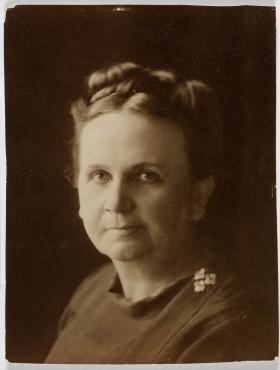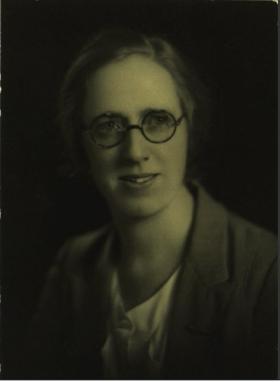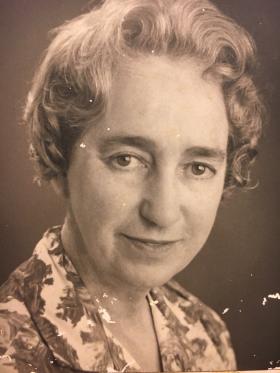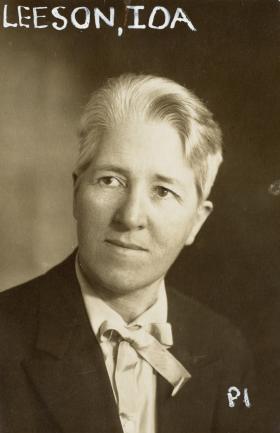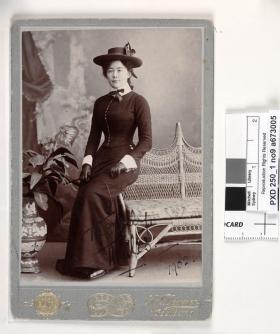We take a look at four outstanding women who helped shape our magnificent Library. Each of their unique contributions has left a lasting legacy and paved the way for women in librarianship and beyond.
Nita Kibble
Nita Bernice Kibble (1879–1962) was born on 8 June 1879 at Denman, New South Wales, the younger daughter of George Augustus Frederick Kibble, Scottish postmaster, and his wife Eliza, nee McDermott. Nita was educated at Denman Public School and St Vincent's College, Potts Point, Sydney.
Nita began her library career on probation as a junior attendant in the lending branch of what was then the Public Library of New South Wales on 20 November 1899, when her signature on the application form was taken for a man's. She became the first female librarian employed at the Library and held the position of Principal Research Officer from 1919 until her retirement in 1943. Throughout her career she worked hard to raise the status of the library profession and was a founding member of the Australian Institute of Librarians.
In an era when women in Australia did not often receive equal pay for equal work and were excluded from some professional opportunities, the library offered a career path for women. Educated women were recruited to work as reading room attendants and from there they could progress into the clerical and professional divisions of the Public Service Board. Nita progressed through the ranks and passed the Public Service Board examinations, eventually establishing the Library's first research department in 1918. Nita was described by Mr Ifould, the State Librarian as ‘a fine example of patience, imagination and wide knowledge combined’.
Kibble raised her niece, Nita May Dobbie, from birth. In her will, Dobbie established the Nita B Kibble Literary Awards for Women Writers in memory of her aunt. The awards recognise the works of women writers of fiction or non-fiction classified as 'life writing'. This includes novels, autobiographies, biographies, literature and any writing with a strong personal element. There are two components to the awards: The Kibble Literary Award recognises the work of an established Australian woman writer, The Dobbie Literary Award recognises a first published work from an Australian woman writer.
Nita Kibble's biography is available at the Australian Dictionary of Biography website.
Jean Arnot
Jean Fleming Arnot MBE (1903–1995) — librarian, trade unionist and feminist — was born at Pymble, NSW. Educated at Fort Street Girls’ High School, she had a long and distinguished career in librarianship with the Public Library of New South Wales from 1921. Working variously as Extension Librarian for regional NSW (1944–1948), Head Cataloguer (1950–1968) and Acting Mitchell Librarian (1956–1958), Arnot was awarded the NSW Public Service Association’s Gold Medal (1944). A founding member in 1949 of the Library Association of Australia, Arnot attended the First International Conference on Cataloguing Principles in 1961, her cataloguing expertise remaining much in demand after her retirement in 1968.
An accomplished and popular public speaker, from 1937 Miss Arnot actively campaigned for equal pay for women, later becoming President of the National Council of Women of NSW (1960–1966). Honing her debating skills on a range of issues, in 1959 she was the only female representative at the NSW Premier’s Conference on Unemployment.
The Jean Arnot Memorial Award is presented by the State Library each year to a female librarian or student of librarianship for an outstanding paper of no more than 5000 words on any aspect of librarianship. The Fellowship is funded by a generous donation from the National Council of Women of New South Wales and the Australian Federation of Business and Professional Women's Associations to commemorate Miss Arnot and her achievements.
To find out more about Jean Arnot visit the Wikipedia page.
Phyllis Mander-Jones
Phyllis Mander-Jones MBE (1896–1984) was born in Homebush, the eldest child of George Mander Jones, the grandson of the retailer David Jones and Margaret Arnott, the daughter of the biscuit manufacturer. She was educated at Abbotsleigh and the University of Sydney, graduating with a Bachelor of Arts.
Miss Mander Jones (as she was then known; the hyphen was added later in life) joined the staff of the Public Library of NSW in 1925 as a library assistant, became a qualified librarian in 1933, was appointed to the position of bibliographer in 1941, and in 1947 she became Mitchell Librarian. For the next 10 years, she trained staff and established new standards in the care and recording of collections, particularly in the conservation of manuscripts, maps and pictorial material. She acquired a number of significant original documents for the Library including the second collection of Macarthur papers and the early records of the Supreme Court of NSW.
In 1956 Phyllis Mander-Jones went to London to work on the records of the London Missionary Society and other papers. In 1958 she resigned her position as Mitchell Librarian and was then appointed State Librarian’s Officer in London, a position she held until 1960. It was then she took over the work of the Australian Joint Copying Project, under the joint administration of the ANU and the National Library of Australia. This led to the publication of her major life’s work in 1972: Manuscripts in the British Isles Relating to Australia, New Zealand and the Pacific.
Eventually Mander-Jones returned to Australia and was awarded an MBE in 1971. In retirement she pursued her interest in bibliography, contributing to J C Beaglehole’s 1974 book The Life of Captain Cook, as well as researching the family history of her Arnott ancestors.
Phyllis Mander-Jones died in Adelaide in 1984.
Phyllis Mander-Jones' biography is available at the Australian Dictionary of Biography website.
Ida Leeson
When Ida Emily Leeson (1885–1964) became the first female Mitchell Librarian in 1932, she cut a distinctive figure. A small woman with short-cropped hair, steel-rimmed glasses, tailored suits and sensible shoes, she walked quickly and spoke in a deep voice. Although the best qualified for her position, her appointment was opposed because of her gender, working-class background and unorthodox choice of partner.
Ida was born on 11 February 1885 at Leichhardt, Sydney, the daughter of Thomas Leeson, a carpenter from Canada, and his Australian-born wife Mary Ann nee Emberson. Ida’s schooling began at Kegworth Public School and, after being awarded a bursary, she attended Sydney Girls’ High School from 1898 to 1902. She won a scholarship to the University of Sydney and graduated with a Bachelor of Arts in 1906.
On 27 August 1906 she was appointed as a library assistant at the Public Library of New South Wales. In 1909, when the Library acquired David Scott Mitchell’s invaluable collection of Australian and Pacific material through his bequest, Ida was transferred to the new Mitchell Library and was one of the pioneers who sorted the collection.
It was also in 1909 that Ida met Florence Birch, a YWCA official. Opposites in appearance and personality, the two became inseparable. Through the rest of Ida’s life, Florence was her constant companion, accompanying her on official functions and overseas trips.
In July 1916 Ida was promoted to senior cataloguer at the Mitchell Library and again, in June 1919, to principal accessions officer, one of the Public Library's senior positions.
In her new role Ida was responsible for acquiring books for the whole Library, but she maintained a particular interest in Australian and Pacific material. During a visit to Britain in 1927 she reported on manuscripts from that part of the world in the Public Record Office and other British repositories. She scored a coup by discovering there the original of the allegedly missing third volume of explorer Matthew Flinders’ 1801–08 log.
In December 1932 Ida Leeson was appointed the second Mitchell Librarian, the second most senior position in the organisation. The trustees had no qualms about her qualifications for the job but, reluctant to appoint a woman to a position in which she would be the obvious successor as principal librarian, they reorganised the Library’s senior management, reducing the status and salary of the Mitchell Librarian. The move was criticised, in vain, by feminists such as Jessie Street.
Under Ida Leeson’s direction in the 1930s, the Mitchell Library consolidated its position as the pre-eminent repository of Australian and Pacific documents. Many important historical and contemporary collections were acquired, the Library’s role as the New South Wales State archival agency was considerably expanded, and the manuscripts in the collection were organised and described. Ida Leeson was awarded King George V’s silver jubilee medal in 1935.
In April 1944 Leeson was seconded to the position of research officer in the Directorate of Research (and Civil Affairs), as a captain, then major, in the Australian Military Forces. She was a key member of the director Alfred Conlon’s high-profile ‘think-tank’ and later referred to Conlon as a ‘life-changer’. She did not return to the Mitchell Library, although she did not officially resign until April 1946. In mid-1949 she went to Noumea to establish a library for the South Pacific Commission. She returned to Sydney in April 1950 where she continued to work for the commission’s social development section until 1956, compiling A Bibliography of Bibliographies of the South Pacific (1954).
Ida and Florence were still together when Florence died in 1957. Ida died on 22 January 1964.
While Ida Leeson’s public life is well documented, there are few records that help us tell the story of Ida the person. Her brother destroyed most of her papers after her death, and her Library personnel file is lost. One place where Ida’s memory is preserved is in the Mitchell Library catalogue cards, which you can find written in her elegant hand.
Further reading: Ida Leeson: a Life. Not a Blue-stocking Lady by Sylia Martin (Allen & Unwin, 2006). Sylvia Martin was the winner of the CH Currey Memorial Fellowship in 2002.
The Library congratulates the many women throughout history who have played a part in the evolution of gender equality.

